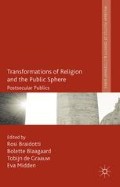Abstract
Jürgen Habermas is, without any doubt, one of the most influential, albeit not undisputed, authors in the debate about ‘postsecularity’, ‘post-secularism’, ‘the postsecular’, ‘postsecular societies’, and so forth. Unlike many other authors who use these concepts to describe and explain the continuing presence of religion in contemporary ‘modern’ societies (see Beckford, 2012), the core of Habermas’s notion of the postsecular society is normative. It includes an ethics of citizenship that aims at making it possible that all citizens can participate as equals in democratic procedures, including public political debate about matters of common interest, and hence in co-determining the development of their society. This contribution critically examines Habermas’s proposal of an ethics of citizenship in postsecular societies in view of the question whether it is able to adequately deal with problems that arise in public controversies about particular verbal and non-verbal acts of expression, namely acts which are understood by their authors as contributions to public debate, which are experienced by numerous believers as denigration of their religion, and as offence to their religious sensibilities. Controversies about such acts offer especially interesting possibilities for an investigation of normative dimensions of the notion of the postsecular and post-secular societies, respectively.
Access this chapter
Tax calculation will be finalised at checkout
Purchases are for personal use only
Preview
Unable to display preview. Download preview PDF.
References
Baumgartner, C. (2013). ‘Secular Critique of Protests against Religiously Offensive Acts. A Threat Against Democracy?’ In G. Buijs, T. Sunier, and P. Versteeg (eds) Risky Liaisons? Democracy and Religion: Reflections and Case Studies, 112–127. Amsterdam: VU University Press.
Beckford, J.A. (2012). ‘Public Religions and the Postsecular: Critical Reflections.’ Journal for the Scientific Study of Religion 51(1), 1–19.
Boe, C. and Hervik, P. (2008). ‘Integration through Insult?’ In E. Eide, R. Kunelius and A. Phillips (eds) Transnational Media Events. The Mohammed Cartoons and the Imagined Clash of Civilizations, 213–234. Gothenburg, Sweden: Nordicom.
Brink, B.van den (2007). ‘Imagining Civic Relations in the Moment of their Breakdown: A Crisis of Civic Integrity in the Netherlands.’ In A.S. Laden and D. Owen (eds) Multiculturalism and Political Theory, 350–373. Cambridge: Cambridge University Press.
Conferentia Episcopalis Scandiae (2006). ‘The Nordic Bishops’ Conference Deplores the Publication of Cartoon Drawings of the Prophet Mohammed.’ 2 February. Retrieved from http://www.katolsk.no/nyheter/2006/02/02–0003.gif.
Dillon, M. (2012). ‘Jürgen Habermas and the Postsecular Appropriation of Religion: A Sociological Critique.’ In P.S. Gorski, D.K. Kim, J. Torpey, and J. VanAntwerpen (eds) The Postsecular in Question. Religion in Contemporary Society, 249–278. New York: New York University Press.
Habermas, J. (2004). ‘Religious Tolerance — The Pacemaker for Cultural Rights.’ Philosophy 79(1), 5–18.
Habermas, J. (2006). ‘Religion in the Public Sphere.’ European Journal of Philosophy 14(1), 1–25.
Habermas, J. (2008). ‘Notes on Postsecular Society.’ New Perspectives Quarterly 25(4), 17–29.
Hirsi Ali, A. (2006). ‘The Right to Offend.’ Speech delivered in Berlin, 9 February 2006. NRC Handelsblad, 10 February 2006. Retrieved from http://www.nrc.nl/opinie/article1654061.ece/The_Right_to_Offend.
Huntington, S. (1996). The Clash of Civilizations and the Remaking of World Order. New York: Simon & Schuster.
Klausen, J. (2009). The Cartoons That Shook the World. New Haven and London: Yale University Press.
Levey, G.B. and Modood, T. (2009). ‘Liberal Democracy, Multicultural Citizenship and the Danish Cartoon Affair.’ In G.B. Levey and T. Modood (eds) Secularism, Religion and Multicultural Citizenship, 216–242. Cambridge: Cambridge University Press.
Mahmood, S. (2009). ‘Religious Reason and Secular Affect: An Incommensurable Divide?’ In T. Asad, W. Brown, J. Butler, and S. Mahmood (eds) Is Critique Secular? Blasphemy, Injury, and Free Speech, 64–100. Berkeley, Los Angeles, London: University of California Press.
March, A. (2012). ‘Speech and the Sacred: Does the Defense of Free Speech Rest on a Mistake about Religion?’ Political Theory 40(3), 319–346.
McGowan, M.K. (2009). ‘On Silencing and Sexual Refusal.’ The Journal of Political Philosophy 17(4), 487–494.
Naef, S. (2007). Bilder und Bilderverbot im Islam. Vom Koran bis zum Karikaturenstreit. München: Verlag C.H. Beck.
Peters, P. (2008). Public Deliberation and Public Culture. The Writings of Bernhard Peters1993–2005. Edited by H. Wessler. New York: Palgrave MacMillan.
Rose, F. (2006). ‘Why I Published Those Cartoons.’ Washington Post. 19 February. Retrieved from http://www.washingtonpost.com/wp-dyn/content/article/2006/02/17/AR2006021702499.html.
Rostboll, C.F. (2009). ‘Autonomy, Respect and Arrogance in the Danish Cartoon Controversy.’ Political Theory 37(5), 623–648.
Scanlon, T. (2003). The Difficulty of Tolerance. Essays in Political Philosophy. Cambridge and New York: Cambridge University Press.
United Nations Department of Public Information, Secretary General SG/2105. (2006). ‘Joint UN, European Union, Islamic Conference Statement Shares “Anguish” of Muslim World at Muhammad Caricatures, but Condemns Violent Response.’ Retrieved from http://www.un.org/News/Press/docs/2006/sg2105. doc.htm.
Wessler, H. and Wingert, L. (2008). ‘Study of the Public Sphere. Bernhard Peters’ Interest and Contribution.’ In B. Peters (author) and H. Wessler (ed.) Public Deliberation and Public Culture. The Writings of Bernhard Peters1993–2005, 1–13. New York: Palgrave Macmillan.
Editor information
Editors and Affiliations
Copyright information
© 2014 Christoph Baumgartner
About this chapter
Cite this chapter
Baumgartner, C. (2014). Re-examining an Ethics of Citizenship in Postsecular Societies. In: Braidotti, R., Blaagaard, B., de Graauw, T., Midden, E. (eds) Transformations of Religion and the Public Sphere. Palgrave Politics of Identity and Citizenship Series. Palgrave Macmillan, London. https://doi.org/10.1057/9781137401144_5
Download citation
DOI: https://doi.org/10.1057/9781137401144_5
Publisher Name: Palgrave Macmillan, London
Print ISBN: 978-1-349-48632-8
Online ISBN: 978-1-137-40114-4
eBook Packages: Palgrave Social Sciences CollectionSocial Sciences (R0)

